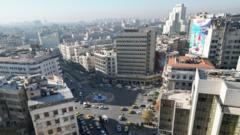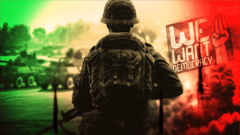As rebel factions mobilize against government forces, the conflict marks a critical point that could redefine Syria's ongoing civil war and its geopolitical implications.**
Surge in Rebel Control Reshapes Syria's Civil War Amidst Ongoing Turmoil**

Surge in Rebel Control Reshapes Syria's Civil War Amidst Ongoing Turmoil**
Syrian opposition forces have seen significant advances against President Assad's regime, raising concerns about stability in the region.**
The recent developments in Syria's protracted civil war indicate a significant shift in power dynamics as opposition groups, notably backed by the Islamist faction Hayat Tahrir al-Sham, have gained ground against President Bashar al-Assad’s forces. Just days ago, these rebels seized control of the city of Aleppo and successfully pushed the government forces out of Hama, now approaching Homs and threatening the capital, Damascus.
This offensive follows over a decade of stalemate, characterized by shifting alliances and ongoing struggles among various factions, including domestic opposition groups and extremist elements. The war, which began during the Arab Spring, has claimed more than 500,000 lives and displaced millions, as international powers such as the United States, Russia, and Iran have taken sides, further complicating the conflict.
The advances made by the rebel coalition have incited fears of potential chaos in Syria should Assad's government lose its grip on power in key areas. Analysts argue that a rebel victory could lead to unforeseen political and social repercussions in both Syria and the broader Middle East, prompting neighboring countries to reassess their border security and strategic responses.
As the situation on the ground evolves rapidly, the implications of these developments remain uncertain. A shift in control brings new questions to the forefront: What does this mean for foreign intervention? How will the international community respond? And what could be the future of Assad's regime amidst growing opposition? As these questions linger, the dire situation in Syria continues to unfold, demanding a close watch on all parties involved in this enduring conflict.
This offensive follows over a decade of stalemate, characterized by shifting alliances and ongoing struggles among various factions, including domestic opposition groups and extremist elements. The war, which began during the Arab Spring, has claimed more than 500,000 lives and displaced millions, as international powers such as the United States, Russia, and Iran have taken sides, further complicating the conflict.
The advances made by the rebel coalition have incited fears of potential chaos in Syria should Assad's government lose its grip on power in key areas. Analysts argue that a rebel victory could lead to unforeseen political and social repercussions in both Syria and the broader Middle East, prompting neighboring countries to reassess their border security and strategic responses.
As the situation on the ground evolves rapidly, the implications of these developments remain uncertain. A shift in control brings new questions to the forefront: What does this mean for foreign intervention? How will the international community respond? And what could be the future of Assad's regime amidst growing opposition? As these questions linger, the dire situation in Syria continues to unfold, demanding a close watch on all parties involved in this enduring conflict.




















